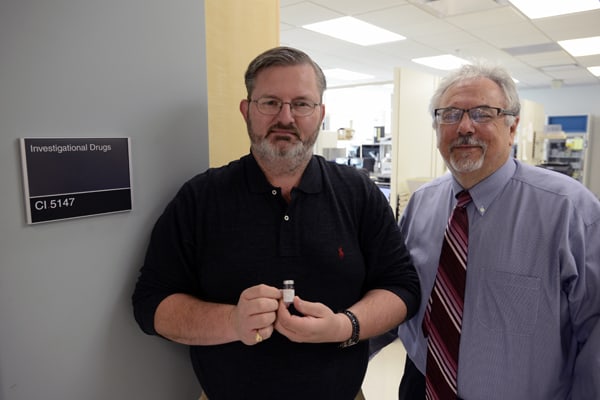
Oct. 22, 2015 | Behind the headlines of his breast cancer vaccine, now in a phase II clinical trial, UAMS’ Thomas Kieber-Emmons, Ph.D., tells a back story that inspires him and even draws applause from colleagues.
Kieber-Emmons peppers the story with some significant numbers: 1, 6, 28, 1,500, 4,000. The story begins in 2005 with 1, meaning Kieber-Emmons’ first-in-man, computer-designed vaccine. No researcher at UAMS had developed such a vaccine or attempted the mammoth effort to deliver a synthesized product that could be safely tested in humans.
“This is not for the faint of heart,” he said.
In addition to required preclinical safety/toxicity studies mandated by the FDA, which were firsts in their own right at UAMS, requiring a rethinking of how the institution viewed such studies, Kieber-Emmons sought assistance within UAMS to prepare his investigational new drug (IND) application for the FDA. A meeting was arranged with the then-Research Support Center, now the Office of Research Regulatory Affairs.
“There were 28 people there,” he recalled, shaking his head in amazement. “My first thought was, ‘why 28?’ So many people were part of this story, and it turns out they all had a meaningful role to play. It really did take a village.”
Having joined UAMS from the University of Pennsylvania, which has a much larger biomedical research enterprise, Kieber-Emmons was astonished that UAMS had such expertise. His previous employer would have had to hire a contract firm to handle what UAMS did by itself, he said. “It’s just phenomenal. The resources that UAMS brought to this is big-time.”

Still, getting his vaccine discovery into a form that could be tested in humans tested the limits of UAMS’ research resources, said Larry Parker, a mainstay on the project as Quality Assurance Unit manager for the Office of Research Regulatory Affairs.
“We were stretched to pull it off,” he said. “There are a lot of wheels and gears that have to be moving in the right direction to do this kind of stuff.”
Other key staff included Carole Hamon, Regulatory Affairs Unit Manager (retired, 2014), and Raymond Anderson, Quality Assurance Unit manager (retired, 2009).
In addition to numerous meetings with FDA staff, there were weekly meetings involving Kieber-Emmons and UAMS staff as they worked to meet the agency’s extensive safety requirements. Their work included writing 97 standard operating procedures (SOPs) that required the agency’s approval.
The IND application, submitted in 2011, was more than 1,500 pages, the largest IND application ever submitted by UAMS. Of all the numbers in Kieber-Emmons’ story, six may be his most prized; that’s how many questions the FDA posed after its review of the application.
“I’m almost more proud of that than the results of the vaccine, which is doing very well,” Kieber-Emmons said. “Other investigators are just amazed when I tell them there were only six questions; people clap.”
The FDA’s questions were received by Kieber-Emmons late on a Friday, and he and staff went to work that weekend drafting their responses, which went in the mail on Monday.
The experience speaks to the quality of people at the Office of Research Regulatory Affairs, he said.
“Our research support people know what they’re doing and they are very careful, so I love them, and I think they’re just the best,” he said.
The vaccine proved to be safe in a phase I trial. The phase II trial is examining if the vaccine improves the efficacy of preoperative chemotherapy. The trial includes women who are newly diagnosed with breast cancer to determine if the combination of vaccine and standard chemotherapy improves the benefit from preoperative therapy.
The heavy workload on Kieber-Emmons’ project continues for the UAMS Office of Research Regulatory Affairs. Annual reports, adverse event reporting and annual product stability testing are all part of the project’s management. Parker’s work, Kieber-Emmons said, includes working closely with the company that manufactures the vaccine, another company that tests the manufacturing process and a third company that is putting the vaccine into vials.
In his quality assurance/project management role, Parker has been the UAMS contact with these three companies. His job has included planning of testing protocols, manufacturing/testing timelines, review and approval of batch records, product labels, and testing reports. He organizes all the product information from the companies into a format required by FDA for submission.
Parker notes that he has more than 4,000 emails specific to the project dating to March 2006, and several people in his office have in excess of 1,000 emails for the project.
“We’re in the process of filing the fifth complete version of the Chemistry Manufacturing and Control (CMC) section of the IND,” Parker said. “Each of these versions has been in excess of 450 pages, and the current revision is in excess of 600 pages. This doesn’t include the filing of all protocol amendments and annual progress reports to the IND. Needless to say, we’ve killed a few trees to keep this IND up to date with FDA.”
The Office of Research Regulatory Affairs currently manages 15 active INDs that include 20 current clinical trials and 15 investigational device exemptions (IDEs). Parker urges researchers to call his office if they are planning regulated research such as for new drugs or devices.
“Call us sooner rather than later,” he said. “The later we’re involved, the more work the researcher has to redo.”
The Office of Research Regulatory Affairs can be reached at 501-526-6876.
